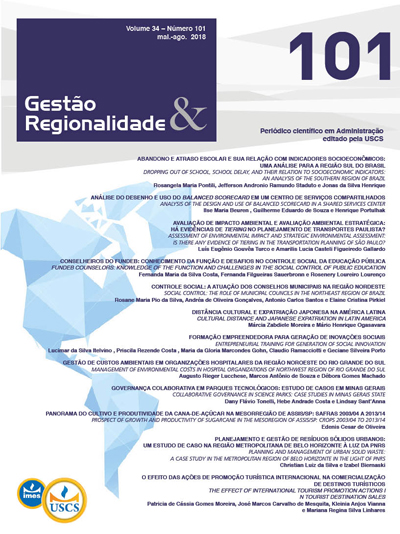PLANEJAMENTO E GESTÃO DE RESÍDUOS SÓLIDOS URBANOS: UM ESTUDO DE CASO NA REGIÃO METROPOLITANA DE BELO HORIZONTE À LUZ DA PNRS
DOI:
https://doi.org/10.13037/gr.vol34n101.3879Resumen
Este artigo visa avaliar a região metropolitana de Belo Horizonte no que se refere ao planejamento e à gestão de resíduos sólidos urbanos (RSU), considerando a complexidade da cadeia de gerenciamento de RSU da região. Para isto, esta pesquisa se utilizou da análise qualitativa por meio de dados primários e secundários, com a verificação do cumprimento da Lei Federal n. 12.305/10 e da aplicação de um questionário para identificar na região a presença das variáveis que são influentes para o gerenciamento de RSU. Por resultado, quanto à legislação, obteve-se que a região metropolitana de Belo Horizonte segue o proposto pela Lei Federal n. 12.305/10, já quanto à presença das variáveis influentes no gerenciamento de RSU, o município de Belo Horizonte possui três variáveis ausentes em seu sistema de gerenciamento: incentivo financeiro, infraestrutura urbana e usina de incineração.
Palavras-chave: Política Nacional de Resíduos Sólidos; gerenciamento de resíduos sólidos urbanos em Belo Horizonte; plano metropolitano de resíduos sólidos; Belo Horizonte; resíduos sólidos urbanos.
Descargas
Descargas
Publicado
Cómo citar
Número
Sección
Licencia
Autores que publicam nesta revista concordam com os seguintes termos:
- Autores mantém os direitos autorais e concedem à revista o direito de primeira publicação, com o trabalho simultaneamente licenciado sob a https://creativecommons.org/
licenses/by-nc-nd/4.0/ , permitindo o compartilhamento do trabalho com reconhecimento da autoria do trabalho e publicação inicial nesta revista. - Autores têm autorização para assumir contratos adicionais separadamente, para distribuição não-exclusiva da versão do trabalho publicada nesta revista (ex.: publicar em repositório institucional ou como capítulo de livro), com reconhecimento de autoria e publicação inicial nesta revista.
- Autores têm permissão e são estimulados a publicar e distribuir seu trabalho online (ex.: em repositórios institucionais ou na sua página pessoal) a qualquer ponto antes ou durante o processo editorial, já que isso pode gerar alterações produtivas, bem como aumentar o impacto e a citação do trabalho publicado (Veja O Efeito do Acesso Livre).
























